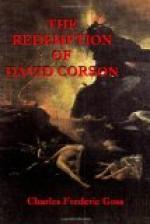For the first time in his life McFarlane gave serious attention to a petition addressed to the Supreme Being. Other prayers had disgusted him because of their vulgar familiarity with the Deity, or repelled him by their hypocrisy; but there was something so sincere and simple in the childlike words which issued from the cabin as to quicken his soul and turn his thoughts upon the mysteries of existence. He had received the gift of life as do the eagles and the lions—without surprise. Had any one asked him: “Andy McFarlane, what is life?” he would have answered: “Life? Why it is just life.”
But suddenly a voice, heard in the quiet of a wilderness, a voice full of tenderness and pathos, issuing from unknown and invisible lips and ascending into the vast and illimitable spaces of air, threw wide open the gates of mystery. His heart was instantly emptied of its passions; his soul grew calm and his whole nature became as impressionable as wax.
When at length the prayer had ended and the sermon began, every power of his mind was strained to its utmost capacity, and he listened as if for life. The buried germs of desires and aspirations of which he had never dreamed were quickened into life with the rapidity of the outburst of vegetation in a polar summer. Words and phrases which had hitherto seemed to him the utterances of fools or madmen, became instinct with a marvelous beauty and a wondrous meaning. They flashed like balls of fire. They pierced like swords. They aroused like trumpets. Such was the susceptibility of this great soul, and such was the power of that simple eloquence.
Andy McFarlane, the child of poverty, the rude lumberman, the hardy frontiersman, was by nature a poet and a seer, and this was his new birth into his true inheritance. Those eyes which had never wept, swam in tears. Those knees which had never trembled before the visible, shook in the presence of the unseen.
The emotions have their limitations as well as the thoughts, and McFarlane had endured all that he was capable of sustaining. With a profound sob, in which he uttered the feelings he could not speak, he turned and fled. It was this sob and these footsteps which David heard.
Plunging into the depths of the forest as a wounded animal would have done, he cast himself upon the bosom of the earth at the foot of a great tree, to find solitude and consolation.
There are wounds in the soul too deep to be healed by the balm which exudes from the visible elements of Nature. There are longings and aspirations which the palpable and audible cannot satisfy. Not what he sees and touches, but what he hopes and trusts, can save man in these dark moments from the final despair and terror of existence.
Upon such an hour as this the lumberman had fallen. God had thrust Himself upon his attention. Instead of being compelled to seek a religious experience, he found it impossible to escape it.




